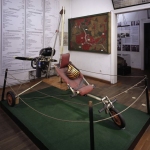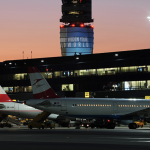
Ivo Zdarsky and his Microlight mortorized hang glider. (Credit: The Insider)
I’m not much of a handyman, but I did build a one-man flying machine once when I was 13. It never got off the ground, though, because the lady across the street wanted her washing machine motor back.
Ivo Zdarsky wasn't just building a plane. He was building an escape to freedom.
It’s just as well, because my friend Markey and I had never figured out how to get the craft to land if, in fact, we ever got it to take off.
But that machine’s design and more importantly, purpose, pales in comparison to the one I’ve seen several times in Berlin’s Checkpoint Charlie Museum.
A solo flight
That would be the Microlight, a motorized hang glider built by a young Czech handyman, Ivo Zdarsky, to fly him over the Iron Curtain to freedom in 1984, five years before the fall of the Berlin Wall.
His craft was powered by the two-stroke engine and fuel tank of the then-ubiquitous European car, the Trabant. As for the propeller, frame, glider wing, and landing gear, they were all spare parts Zdarsky scavenged or built himself.
After hearing of Ivo’s painstaking and risky assemblage, I vowed to never complain about assembling a bookcase from Ikea again.
Ivo vs. the KGB
Ivo was 24 when he starting planning his escape from Czechoslovakia and the KGB. He was a dissenter who wanted a chance at a life he couldn’t have in this repressed country. He wanted to build airplanes one day. But he told no one of his escape plans — nor of the motorized glider he was constructing, one piece at a time.
Like so many others caught behind the Iron Curtain from 1961-1989, Ivo wanted out and he was willing to risk life and limb to get out. So he began gathering parts for his Microlight and vowed to make his dream of escape, a reality.
Finally, on his appointed date of departure, he pushed his three-wheeled contraption out onto a deserted road at 3 a.m., donned his goggles, sent up a quick prayer, and started the engine. The Microlight responded and moved forward, picking up speed on the makeshift gravel runway and things looked good.
A rocky takeoff
At the point of takeoff, however, Ivo’s homemade propeller struck a rock that would have cut a devastating chunk out of it, had it not been for the builder’s forethought: He had added a steel edge to the propeller, and that saved his mission and probably his life. The Microlight continued to ascend.
Ivo flew it low to avoid radar. So low, in fact, that he had to fly it under power lines and some bridges. His destination was neighboring Austria. Miraculously, he made it, landing his wing and a prayer, not on another deserted gravel road, but at the Vienna International Airport.
The Microlight must hold the record for the smallest aircraft ever to land at this mammoth facility.
To this day, Ivo remembers with gratitude the Austrian guards at the airport who took him in, gave him coffee and doughnuts and a bed in an unlocked jail cell. He was granted political asylum, and the Austrians protected him by moving him from place to place in the country to keep any angry Czech KGB posse from locating him.
A new life
Then, six weeks after landing in Vienna, he emigrated to America and began life anew in Long Beach, California. He wasted no time pursuing his dream, and he soon founded a propeller manufacturing company he called simply, Ivoprop.
Finding the LA area too congested, he moved to Utah and, five years later, bought an abandoned airport in the equally abandoned desert town of Lucin. He built a hangar, moved in, and has been there ever since. He says only half of the building is a hangar, though. The other half is his “man cave.”
One propeller, two propellers
Looking back on his experience, Ivo told a reporter he has always just wanted to live free and build propellers. In America, he got his chance to do just that, and more.
“I was flying these ultralight hang gliders, and I couldn’t find a good propeller, so I just made one,” he said. “People liked it, so I sold the propeller, and then I had money to make two propellers. Then I sold two propellers and had money to make three propellers…”
He just kept building and selling propellers and also built a company in the process. Today, Ivoprop Corp. builds composite propellers for homebuilt and ultralight aircraft and airboats.
Still, one might ask, if Ivo is so successful, why live in an airplane hangar?
“I don’t like walls,” he says.
I am a writer, college professor, and author of several nonfiction books, including three on the decade of the 1960s. Several wonderful essays of gifted Retrospect authors appear in my book, "Daily Life in the 1960s."





What an amazing story. Thanks for sharing it.
You’re very welcome, Laurie. It’s one of so many on display at the Checkpoint Charlie Museum. Makes you realize how universal the hunger for freedom really is.
Jim, this is a wonderful story and I enjoyed reading it. However, I am more than a little intrigued by your first paragraph. I want to know more about your flying machine, and the lady across the street, and how you managed to get her washing machine motor in the first place. Any chance for another story this week?
Thanks, Suzy. Inasmuch as the statute of limitations has passed on that incident, maybe I could craft a piece on it, although the whole thing turned out to be a bust. Just not the kind involving cops.
A very inspiring story, Jim, and perfect for this moment in time. I am glad that Ivo flew his way to freedom and can live as he wishes. No walls for him seems like a great idea.
So many stories like his surfaced from that 28-year period when the Wall stood, Marian. Thanks for your comment.
What an amazing and inspiring story, Jim. And — not surprisingly — beautifully told. Thank you for sharing it with us.
And what a perfect last line — both literally and metaphorically.
Thank you, John. I appreciate it. I’ll never forget the first time I visited the Checkpoint Charlie Museum in 1999 and began seeing the displays of all the contraptions East Europeans had built to escape the repression of Communist countries. It was awe-inspiring. Everyone craves the freedom to live their lives as they choose.
Wonderful written and told Jim and – unfortunately – eerily timely.
Tear down the walls.
Thank you, Dana. The situation in Ukraine — and especially the courage of their people — brought all my memories of the Cold War escapees to mind. Freedom: it’s a universal hunger.
👍👍👍
Wonderfully crafted and moving tale, Jim. I loved your intro with your throw-away punch line about the neighbor’s washing machine motor. Resourcefulness is always the inventor’s #1 ally! You built a terrific character via your descriptions of his desperate but elegant contraptions and I loved your closing line! Thanks, very moving!
Thanks much, Charles. It’s taken me a long time to learn that less is more, and I still have to remind myself of that.
This was a great story for so many reasons–the inventiveness, the daring, the drama, the denouement, the rhythm, the quest for freedom. It kept attention throughout–you write so well. I hadn’t heard of Ivo, and I’m sure his is just a particularly notable escape story among many. It was inspiring to read at a time when things look pretty bleak in the world.
Thank you so much, Khati. You never know where a piece of writing will take you. You never know where a piece of writing will take you. When I began writing on this prompt, I thought I was going to just write about some of my own backyard construction ventures as a kid. But when I started writing about my helicopter, I instantly connected it to the homemade glider I’ve seen several times in the Checkpoint Charlie Museum. So I did some digging about its pilot and inventor, and that was Ivo. I had never heard of him before I started writing about him. What a fascinating guy he is. Makes me want to go to Utah, do some extended interviews with him, and write his story in a book. Glad you enjoyed this little story!
Isn’t that so true–you never know where you are going when you start out. If you get a chance, it would be great to visit Ivo. I wonder if he would be receptive, or is a happy recluse. A remarkable story, and the quest to connect would likely be a good one too, regardless of its ending.
OK, Khati, you’ve convinced me to give it a try. Thanks!
Fascinating story, Jim. As all the others have said, particularly relevant in light of the current events in Ukraine and Russia today. The yearning to be free is tremendously strong; Ivo’s desire to not be constrained by walls speaks volumes.
Thank you, Betsy. And you’re right, of course, about the quest for freedom.